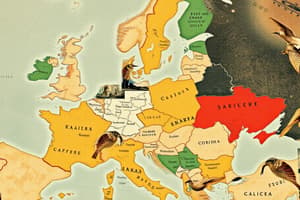Podcast
Questions and Answers
What were some impacts of the Industrial Revolution in Europe during the nineteenth century?
What were some impacts of the Industrial Revolution in Europe during the nineteenth century?
- Increased productivity, ruralization, harsh working conditions
- Decreased productivity, ruralization, improved working conditions
- Increased productivity, urbanization, harsh working conditions (correct)
- Stagnant productivity, urbanization, harsh working conditions
Which technological advancements were significant during the Industrial Revolution in Europe?
Which technological advancements were significant during the Industrial Revolution in Europe?
- Steam power and new machinery (correct)
- Wind power and traditional looms
- Water wheels and manual spinning wheels
- Hand tools and horse-drawn carts
What inspired movements for independence and liberty across Europe during the nineteenth century?
What inspired movements for independence and liberty across Europe during the nineteenth century?
- The British Empire expansion
- The French Revolution (correct)
- The Spanish Inquisition
- The Russian Revolution
What were some consequences of the rapid industrial growth in Europe during the nineteenth century?
What were some consequences of the rapid industrial growth in Europe during the nineteenth century?
During the nineteenth century, what role did nationalism play in Europe's history?
During the nineteenth century, what role did nationalism play in Europe's history?
What significant role did nationalism play in shaping the political landscape of Europe during the nineteenth century?
What significant role did nationalism play in shaping the political landscape of Europe during the nineteenth century?
Which factor contributed to growing inequality and poverty during the nineteenth century social changes?
Which factor contributed to growing inequality and poverty during the nineteenth century social changes?
What was a consequence of Europe's colonial expansion in the nineteenth century?
What was a consequence of Europe's colonial expansion in the nineteenth century?
During the nineteenth century, what significant change influenced social structures in Europe?
During the nineteenth century, what significant change influenced social structures in Europe?
What characterized the revolutions of 1848 in Europe?
What characterized the revolutions of 1848 in Europe?
Flashcards are hidden until you start studying
Study Notes
Europe in the Nineteenth Century
Introduction
The nineteenth century marked significant changes in Europe, bringing about transformative developments in various aspects of life, including industry, politics, society, colonialism, and nationalism. During this time, the continent experienced rapid industrial growth, revolutionary movements, the spread of nationalist sentiments, social upheaval, the expansion of empires, and the influence of figures like Florence Nightingale.
Industrial Revolution
The Industrial Revolution, which began in Britain during the late eighteenth century and continued throughout the nineteenth century, had profound impacts on the economy and society. Technological advancements led to increased productivity and efficiency, resulting in urbanization and the growth of factory towns. This period saw the rise of textiles and iron industries, steam power, and the introduction of new machinery. However, the industrialization brought about harsh working conditions, child labor, and exploitation of workers, leading to growing concerns among the public and eventually prompting improvements in labor rights.
Revolutionary Movements
The spirit of revolution was present across Europe during the ninteenth century. The French Revolution served as a catalyst for change, inspiring movements for independence and liberty across the continent. One such movement was the revolutions of 1848, which swept through much of Europe, causing political instability and challenging existing monarchies. Despite their temporary success, these movements failed to establish lasting democratic institutions, ultimately paving the way for further conflict.
Nationalism
Nationalism, the belief in the superiority of one's own country above others, played a significant role in shaping the political landscape of Europe during the nineteenth century. As nations sought to assert their sovereignty and identity, tensions rose between ethnic groups and neighboring countries. This led to numerous conflicts, including the Napoleonic Wars, which highlighted the need for a balance of power within the European system.
Social Changes
Social changes during the nineteenth century were influenced by factors such as urbanization, industrialization, and the increasing presence of women in public life. The Romantic movement emphasized individualism and self-expression, challenging traditional societal norms. Economic conditions also contributed to growing inequality and poverty, leading to increased activism among workers and their advocates.
Colonialism
Europe's colonial expansion during the nineteenth century saw countries like Britain, France, Spain, Portugal, and Germany establish colonies across Africa, Asia, and the Pacific. These territories provided resources, markets, and strategic locations for European powers, resulting in competition and conflict between colonial powers. However, this period also marked the beginning of resistance movements against European rule, ultimately leading to decolonization efforts later in the twentieth century.
Ottoman Empire and Florence Nightingale
The Ottoman Empire, which encompassed parts of Europe, the Middle East, and North Africa, underwent significant changes during the nineteenth century. The empire faced challenges from nationalist movements within its territories, as well as encroachment by European powers seeking to expand their own influence. During this period, figures such as Florence Nightingale made significant contributions to healthcare and sanitation practices, shaping modern nursing standards and improving care for soldiers injured in war. Her work would go on to revolutionize the field of medicine and humanitarianism.
In conclusion, the nineteenth century brought about profound changes to Europe, influencing its political landscape, industrial development, and social structures. As the continent navigated these transformations, it laid the groundwork for future conflicts and collaborations, ultimately shaping the world we know today.
Studying That Suits You
Use AI to generate personalized quizzes and flashcards to suit your learning preferences.




